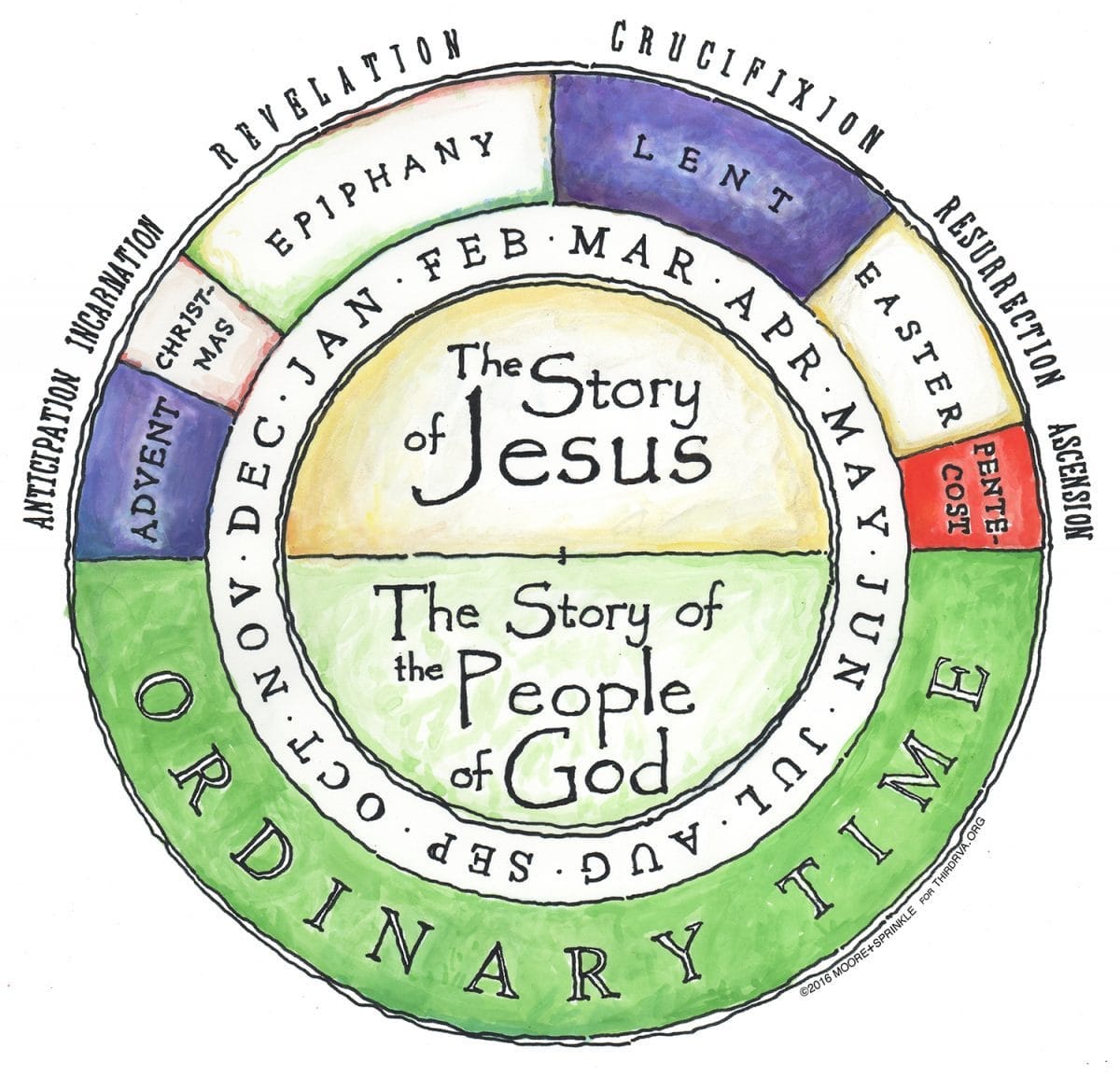Reorienting My Life Around the Liturgical Calendar

I recently wrote about Prayer Beads and Working Through Worship Trauma where I discussed what I've learned about Anglican prayer beads and how I'm using them to start a prayer rhythm. Along with using prayer beads, I've also begun to actively reorient my life around the Liturgical calendar instead of the American calendar.
The Truth of American Holidays Led Me to Change
Over the last 4-5 years, I've slowly questioned the origin and purpose of many American holidays. I've found that most of our holidays are some weird mash-up of multiple holidays (what do pine trees have to do with Jesus being born in the Middle East? Nothing...) or celebrating some severe revisionist history (Thanksgiving, am I right?) Now, I'm not trying to be a super Jacob from Abbott Elementary whose personal disdain for Christmas ruined the holiday for everyone else.

The purpose of this article is not to try to convince anyone to stop observing American holidays or forego those beloved family traditions. My goal is to share how I've come to a place where I am finding more reason to celebrate and be grateful following the Church calendar while letting go of holidays in the American calendar.
Some may ask, "Why not integrate the Church calendar into the American calendar and have the best of both?" That's a great question; to be candid, that's what we do. For the reasons I mentioned above, along with the fact that most holidays are capitalist ploys to get us to spend money on plastic eggs, candy, carcinogenic foods, more candy, turkey, and Black Friday deals, we're very selective about which American holidays we want to participate in. As my family began to stop participating in American holidays over the last few years, there's been a void we've wondered how to fill.
Finding Meaning and Purpose in Ancient Traditions
Let me be clear: we're not becoming Jehovah's Witnesses about holidays. If you don't know what I'm talking about, here's a helpful article:
Why Don't Jehovah's Witnesses Celebrate Holidays
I don't believe cultural holidays are tainted or somehow 'sinful.' My family goes all out for Halloween, and we love the smell of a Noble Fir Christmas tree. However, tied to a good Michael Myers marathon, we also want to remember the Saints who have come before us.
Along with preparing for Trick or Treating, we also pause to reflect on both Saints we read about in Holy Women, Holy Men, and Saints we knew personally. Halloween is an excellent season for a 'Memento Mori' moment. As Christians, we reflect on those who have taken the journey before us and have left their footprints on the path we're currently walking.
The Liturgical Calendar Keeps Me Focused on Jesus, Not Christianity or Americanism
One of the things I love most about the Liturgical calendar is how it creates rhythms throughout the year that keep the church focused on Jesus. After going through a spiritual crisis over the last few years, the two foundations that have kept me a Christian are:
- I still believe in Jesus.
- I can follow Jesus and be intellectually honest about my progressive convictions.
As an aside, I think a significant amount of practices and vocabulary we've labeled 'Christian' in America is so in name but not in practice. I also believe much of Western Christianity has nothing to do with Jesus or his teachings. Because of this, I don't at all see Jesus and Christianity as synonymous with each other.
The liturgical calendar helps me remain focused on Jesus as I continue to ask questions and work through reconstructing a progressive, compassionate, and deeply spiritual faith. For example, we're in the middle of a season of Ordinary Time, which is after Epiphany and before Lent.
For those new to the Liturgical Calendar, here's a helpful graphic that shows each season of the year:

Practical Ways the Liturgical Calendar Shapes Me in Following Jesus
Epiphany is a season that focuses on the Magi visiting the baby Jesus and Jesus's baptism by John the Baptizer. As Epiphany ended, but we're not yet in Lent, I've decided to use this time to focus and learn more about the early life of the historical Jesus. To do this, I'm reading The First Christmas: What the Gospels Really Teach about Jesus's Birth by Marcus Borg and John Dominic Crossan.
I should finish the book in the next few weeks, and when I do, I plan to learn more about the last week of Jesus's life during Lent. The book I plan to read for Lent is also by Marcus Borg and John Dominic Crossan, and it's called The Last Week: What the Gospels Really Teach about Jesus's Final Days in Jerusalem.
My family and I all had COVID or the flu during Advent; we plan to go all out for Lent. We'll participate in all the rhythms leading us up to Easter. Within each 'major' season in the Church calendar, there are natural rhythms that allow my family and I to focus on different aspects of Jesus's life and reflect on how those aspects impact us today.
During Ordinary Time (there are two of these), I try to look back and reflect on the season we're coming out of while looking forward to the season ahead. This helps me identify what spiritual practices or theological questions come to mind that I can learn more about and implement in my daily life.
As much as I enjoy Nathan's hot dogs on the Fourth of July, hyper-processed meat, American exceptionalism, and our country's obsession with militarism don't lead me to pause and reflect. It doesn't stir within me a desire to celebrate, appreciate, and express gratitude. Sorry, Nathan...your hot dogs are super delicious, though.
The Liturgical Calendar roots and grounds me in the Ancient traditions and practices shared by Christians across centuries and millennia. It's focused on Jesus, which helps me not get caught up in Christianity but stay focused on the Master Teacher. Most of all, it helps me experience deep gratitude, reflection, and celebration as I'm reminded my life is a journey that I want to fully experience because one day, I, too, will die.




